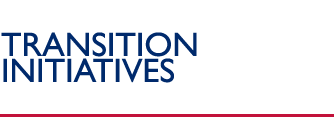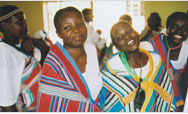USAID/OTI Venezuela Quarterly Report
January - March 2009
Program Description
In August 2002, USAID initiated a program in Venezuela to provide assistance to maintain democratic stability and strengthen the country's fragile democratic institutions. The program operates out of the U.S. Embassy and is part of a larger U.S. diplomatic effort to promote democracy in Venezuela.
The Venezuela program has two main objectives: (1) to strengthen democratic institutions and promote space for democratic dialogue; and (2) to encourage citizen participation in democratic processes. USAID works with several implementing partners drawn from the spectrum of civil society focusing on dialogue, public debate, citizen participation and training for democratic leadership; offering technical assistance for political parties; and providing technical support to human rights practitioners and the supporting civil society.
Country Situation
The Venezuelan political environment in the first three months of 2009 centered on the constitutional referendum on term limits that took place on February 15, the impact of the global economic crisis and low oil prices, and a series of steps toward further nationalization of the economy.
Immediately following the municipal and state elections in late 2008, President Hugo Chavez announced his plans to repeal presidential term limits. On January 16, the Venezuelan National Assembly submitted a request to the Electoral Council for a referendum to approve a constitutional amendment removing the presidential term limit. The request activated a public consultation campaign, and the referendum was later expanded to include the removal of term limits for all elected officials. The process culminated in a referendum vote on February 15.
The lead-up to the referendum was contentious, and the government expended significant state resources in its campaign for a "yes" vote, successfully shifting public opinion as polling went from 65 percent opposed at the end of 2008 to a slight lead for those in favor just prior to the vote. President Chavez also indicated that he would pursue other means to hold on to power should he fail to win the referendum. This pronouncement was at odds with his previous position that he would step down at the end of his term in 2012 if the vote went against the referendum.
A January 20 protest by university students against the move to eliminate term limits was broken up by police using tear gas, plastic bullets, and water cannons. Officers in anti-riot gear scattered more than 2,000 students after they set out from a Caracas plaza to demonstrate against the proposed constitutional amendment.
The referendum took place without any major incidents and passed by a vote of 54 percent to 46 percent, removing term limits for all Venezuela's elected leaders. The 70 percent turnout was the highest turnout since the 2006 presidential election.
While President Chavez has consistently assured Venezuelans that the country is immune to the global economic crisis, economic indicators suggest otherwise. Inflation reached 31 percent in 2008, easily the highest in Latin America, and GDP growth fell to 4.9 percent from 8.5 percent in 2007. A Caracas-based economic analyst forecasted negative growth of 1.5 percent in 2009 and overall inflation of 45 percent.
Immediately following the referendum, Finance Minister Ali Rodriguez announced that the Venezuelan Government would slash public spending to address revenue shortfalls created by the falling price of oil. Venezuela relies on oil for 94 percent of its export revenue and nearly half of the government budget. The state-run oil company, PDVSA, announced plans to cut production costs by 40 percent to make up for falling crude prices. PDVSA president Rafael Ramirez said in a radio interview that cost-cutting measures would include renegotiating deals with contractors that were reached when oil prices climbed to record high levels last year. President Chavez also announced a series of reforms, including an increase in both the sales tax and minimum wage and a slight reduction in expected spending.
These changes were accompanied by further consolidation of central government control over the country. President Chavez ordered the military to seize control of Venezuela's rice mills and told companies that if they did not comply with output demands they would be permanently seized by the State. In 2003, President Chavez introduced price caps on a range of basic foodstuffs, including chicken, rice, and sugar, in an effort to end inflation. Food producers frequently complain that the controls are crippling their business. The nationalization of the Spanish bank Grupo Santander, which owns Banco de Venezuela, one of the nation's largest banks, was also announced. The acquisition was later postponed for the year due to low oil revenues. Chavez had hoped to use the bank nationalization to help channel resources to small farmers and other grassroots groups.
Chavez also called for the central government to retake the administration of the country's ports and airports from state governments. Claiming national security concerns, the president ordered the army to occupy the port facilities of Maracaibo, Puerto Caballo, and Porlamar, which are in states where opposition leaders hold power, Zulia, Carabobo, and Porlamar, respectively. The ports and airports have traditionally been a major source of revenue for state and local governments. Following this announcement, the Venezuelan Government called for the arrest of Manuel Rosales, mayor of the country's second largest city, Maracaibo. Rosales ran against Chavez in the last presidential election and is one of the president's most vocal opponents.
OTI Highlights
A. Narrative Summary
USAID continued its work with local counterparts during the quarter to support nonpartisan education campaigns. Activities focused on generating civic participation from all sectors and political parties, as well as supporting forums on good governance principles. Programmatic highlights from the quarter including the following:
- Supporting forums on the tenets of democratic governance principles and the value of responding to citizens' wants and needs
- Assisting local groups to create nonpartisan materials on local governance based on democratic values (These materials were provided to community leaders and other members of civil society.)
- Promoting fair elections by working with civil society on constitutionally mandated efforts to support electoral observers and witnesses
- Supporting and training human rights groups, some of which have recently focused on monitoring the upswing in threats to human rights defenders
- Training political parties on internal democratization
B. Grants Activity Summary
USAID/OTI, through implementing partners, approved 29 grants during the quarter.
C. Indicators of Success
The program has strived this quarter to take recent lessons learned and implement them going forward. Efforts have been made to focus debate on issues that are relevant to average Venezuelans and to work with willing partners in making government more responsive and accountable.
Reports and public activities by the grantees were successful in diffusing information about areas critical to a functioning democracy, including free and fair elections, human rights, and other important social issues. These activities show the successful work of building the capacity of civil society organizations to play a meaningful role in Venezuelan society.
Program Appraisal
The Venezuela program is like USAID programs in other countries in the hemisphere and around the world in that it seeks to strengthen democracy and its supporting institutions. The program in Venezuela is designed to strengthen civil society and political parties, the key components to a healthy democracy and the channels through which citizens often express their desires, needs, and concerns as well as find ways to collectively address them.
Threats against program counterparts continue, and USAID will continue to monitor these threats. Physical threats against human rights defenders have continued unabated throughout the quarter.
Next Steps/Immediate Priorities
USAID will continue to work in civic education and citizen participation, while continuing to support human rights defenders as they improve their ability to research, report on, and present cases of human rights abuses.
For further information, please contact:
In Washington, D.C.: Russell Porter, LAC Team Leader, 202-712-5455, rporter@usaid.gov.
|




